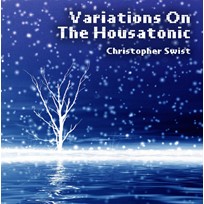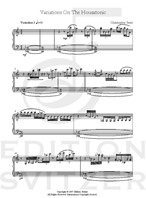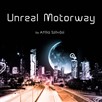
Variations on the Housatonic
Composer: Christopher Swist
Instrument: Marimba and Tape
Level: Advanced
Published: 2007
Price: €25.00
Item details
-
Description +
-
Duration: 14 min.
Having spent 10 years now living in New England it is only natural that at some point I would construct a "New England" piece. With references to the Housatonic River, Charles Ives and recorded samples from Connecticut, this variation set embodies much that is regional. The theme of this set is a partial quotation of the texture in the piano accompaniment to the Charles Ives song "The Housatonic at Stockbridge." In more deference to Ives, the seven variations are heard first with the theme being reserved for the end of the piece. This was a common technique in the music of Ives called cumulative form. The marimba has a clearly differentiated texture in each of the 6 played variations and final theme. Variations 1, 5, and 6 are acoustic. Variations 2, 3, and 4 are accompanied by electronic sounds that process natural sound samples from Connecticut. Variation 7 is electronics only and the theme is accompanied by unprocessed nature samples. The samples were recorded with AKG 451 microphones on a laptop computer with Pro Tools. Sound processing and design was compiled through Digital Performer, Max/MSP, and Pluggo. Variations On The Housatonic was premiered in Connecticut in September of 2007.
-
-
Instrumentation +
-
Marimba and Tape
-
-
About the composer +
-
Christopher Swist spends equal time as a percussionist, composer, engineer, writer, and educator. His music education started at age 6 with Buffalo Philharmonic percussionist John Rowland and continued through multiple degrees in performance and composition from SUNY-Buffalo (Jan Williams) and The Hartt School (Ben Toth and Al Lepak). He culminated his unique compositional voice, performance practice, and recording engineering into 2 solo albums: Whitewater of 2001 and Duality of 2013. His third solo album, Equal Simplicity, is being released in 2025.
Christopher’s varied catalog of orchestral, concerti, percussion, chamber and electronic music is published with Alfred Music, Studio 4 Music, Keyboard Percussion Publications, Edition Svitzer, and Bachovich Music. Swist’s latest work is a Double Concerto for Vibraphone and Marimba that he also performs as the vibraphone soloist. His music has been performed by the Grand Rapids Symphony, Hartford Symphony Orchestra, The Louisville Orchestra, American Modern Ensemble, Grupo PIAP, YoungArts, and the United States Military Academy. He also presents recitals as a performer/composer who plays both acoustic and electronic music.
Christopher is a symphonic musician as well, performing in the percussion sections of symphony orchestras in Hartford, New Haven, Springfield, Waterbury, Bridgeport, Ridgefield, and Norwalk. He has been the principal percussionist of the New Britain Symphony Orchestra since 1999 and directs the NBSO’s educational outreach programs and steel pan/percussion fusion ensembles.
Professor Swist is an educator, pedagogue, and administrator. He is Director of Recording Arts at Trinity College in Hartford. He also designed and built EvenFall Studio LLCin New Hampshire, and, is a pro audio writer/reviewer for SonicScoop. Christopher was recently inducted into the Buffalo Music Hall of Fame.
-
-
Reviews +
-
Review (Percussive Notes, July (60) 2012)
This 14-minute composition for marimba and electronic sounds is, in the composer’s words, “a New England piece.” This refers to the Housatonic River that runs through western Connecticut and Massachusetts and the influence of Charles Ives, also a New Englander, on the thematic material and compositional procedure of the piece.
This work is comprised of seven variations followed by a statement of the theme; variation number seven is for CD playback without marimba and is approximately two minutes in duration. An assistant is required to initiate the two playback cues during the composition; technophiles could easily trigger playback of the accompaniment via foot pedal, as the cues occur at opportune moments during execution of the marimba part. The accompaniment consists of droning arrhythmic noise, making the coordination with the marimba part very easy and the potential combination a worthwhile enterprise.
This work’s aesthetic challenges outweigh its technical demands, and to be effective it will require a mature interpreter who pays deference to the electronic accompaniment and pursues a sensitized interpretation with the fragmentary and textural marimba material.—Ron Coulter
-
-
Credits +
-
Front cover artist: Ronni Kot Wenzell
Performing artist: Christopher Swist
Copyright © Edition Svitzer
Printed in Copenhagen, Denmark
-

